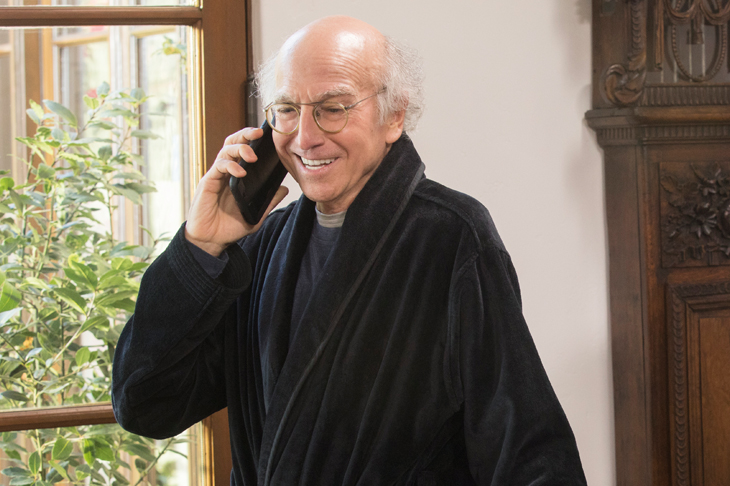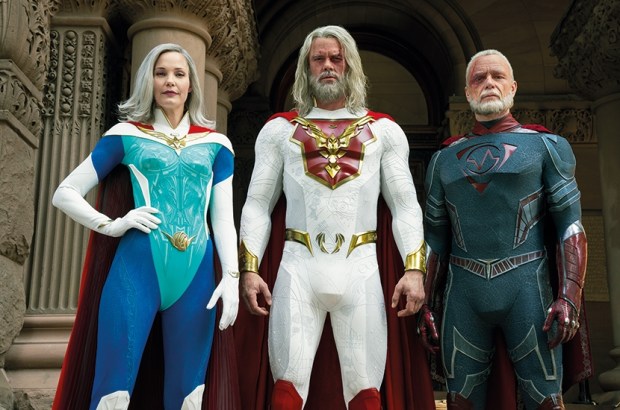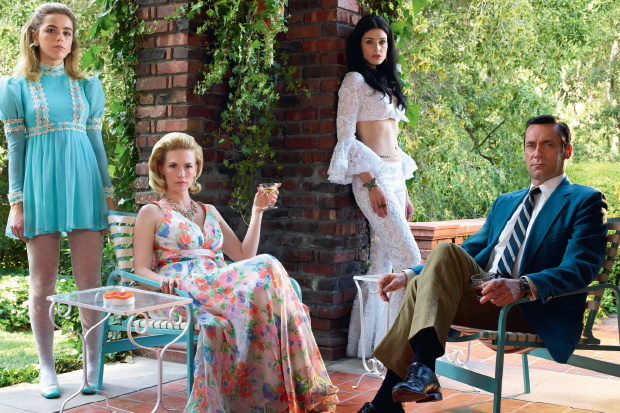The best episodes of Curb Your Enthusiasm are the ones that make you want to hide behind the sofa, cover your ears and drown out the horror by screaming: ‘No, Larry, no!’ I’m thinking, for example, of the one where our hero attends a victim support group for survivors of incest and, in order to fit in, decides to concoct a cock and bull story about how he was sexually abused by his uncle. This, of course, comes back horribly to haunt him when out one day with his blameless real uncle…
But no, I shan’t try to elaborate, for the plots in Curb Your Enthusiasm are as convoluted as any farce. And besides, you should see it for yourself. So long as you don’t mind writhing in embarrassment, and wishing the ground could swallow you up, there really are few things more excruciatingly funny than Curb.
Some people, I know, revere it because it is so groovily (and influentially) postmodern. It purports to show the further, true-life adventures of Jewish comic and writer Larry David — played and written by himself — following the massive success of his surprise hit ‘comedy about nothing’, Seinfeld. As a viewer, you feel as though you’re in on a sophisticated joke — something that the show’s distinctive and rather odd tone (part naturalistic, part archly knowing) encourages.
Underneath all that fancy, self-referential stuff, though, what you have is a very traditional comedy of character in extremis. Sure, Larry isn’t exactly Everyman, with his fame and his multimillion-dollar lifestyle and his complete lack of filter. Nonetheless, more often than not you find yourself thinking: ‘There but for the grace of God go I.’
Take the infamous scene where he bumps into some white American friends with their adopted oriental toddler in a pushchair. Short of something to say, he asks them whether the child is any good with chopsticks. The friends — this is PC Los Angeles — are mildly appalled by this racial stereotyping. But Larry digs himself deeper by insisting that this is a valid question.
As indeed, I’d argue, it is. The comedy, as so often in Curb, lies in the gulf between what people really think and what they’re allowed to say. As David once told Ricky Gervais: ‘We all have good thoughts and bad thoughts, but nobody ever expresses the bad thoughts. We just think them and don’t say them… But the bad thoughts are funny.’
‘Curb Your Enthusiasm’ has two meanings. Partly, it’s a fairly typical piece of downbeat David life philosophy — ‘Always keep to it. To not is unattractive. It’s unseemly,’ he once said. Partly, it was a warning to fans to keep their expectations in check: ‘Don’t expect another Seinfeld.’
It wasn’t. It was possibly something even better — though its groundbreaking originality isn’t so obvious now that it has spawned so many imitations. Ricky Gervais’s Extras, for example, was an obvious homage — especially in the scenes where Gervais’s character has excruciating encounters with real-life superstars (e.g. David Bowie) playing pastiche versions of themselves.
There’s a danger that after a while it can start to look a bit smug, a bit ‘see how famous my friends are and how willing they are to appear in my show’. This has felt increasingly the case in later seasons, such as the last one’s finale where David conducts an escalating dispute with the man who lives above his New York apartment — Michael J. Fox.
Yes, it was daringly tasteless and black to build an episode around Fox’s early onset Parkinson’s disease. (One running joke asks: ‘When he shakes, is that the Parkinson’s or is he angry?’; another is about the degree to which disabled people use victimhood to their advantage.) At the same time, though, you might wonder how daring that joke really is when everyone is so in on it, from Fox (playing an obnoxious version of himself) to the then New York mayor Michael Bloomberg, who ends the episode by banishing David from the city.
That’s a mild quibble, though, rather than a major objection. For me the thing that makes Curb Your Enthusiasm so enduringly watchable isn’t so much the meta stuff — does real life Larry really wear those funny little tops with the zip? Can he afford a better interior decorator? Did George ever get any work after Seinfeld? — as the more basic comedy of character and manners.
Like Alf Garnett and Victor Meldrew, Larry is a man who knows he’s in the right but who is perpetually tormented and frustrated by having to live in an unjust world that conspires continually to make him look like a curmudgeonly buffoon. He is at once the tragic hero with whom you identify; and the comical idiot whom you love to see humiliated.
Well, he is for some of us anyway. How I writhed with agonised recognition during the scene where Larry has just bought a new house only to realise on his first night that he has made a huge mistake: there’s a noise — a ‘house noise’ — that it only makes at night when you’re in bed trying to get to sleep, and now there can never be a moment’s rest till he has traced its source.
David has a knack, like all the best observational comedians, of mining humour from the quotidian, from the stuff that we’ve all worried about but probably never recognised as shared experience till we saw it on Curb. Stuff to do with social etiquette like: when exactly is the ‘cut-off’ point, at night, beyond which it is unacceptable to phone friends; should you call someone out when they spot someone they know in a queue and use it as an excuse to sneak in front of you; how long after a bereavement — ‘the sorry window’ — is it no longer necessary to offer condolences?
Seventeen years ago it probably seemed to many of those involved with Curb quixotic to the point of suicide, or at best, cultish obscurity, to fashion a sitcom about the plight of a man so successful and rich that he never need work or worry about money again. But actually this is where the comedy also lies. Just as in academia disputes are so vicious because ‘the stakes are so low’, so we can watch in awed fascination and schadenfreude as major-league actors, directors and agents, with nothing better to do with their pampered lives, bicker over trivia. Yes, the rich are different: they’re even more tortured and insecure and unhappy than us paupers.
So even if — as he surely must be — Larry David is as big a prize twonk in real life as he is on Curb we can hardly begrudge him for it. He has built a deservedly successful career turning his pain into our gain. Long may he go on suffering!
Got something to add? Join the discussion and comment below.
Get 10 issues for just $10
Subscribe to The Spectator Australia today for the next 10 magazine issues, plus full online access, for just $10.
You might disagree with half of it, but you’ll enjoy reading all of it. Try your first month for free, then just $2 a week for the remainder of your first year.















Comments
Don't miss out
Join the conversation with other Spectator Australia readers. Subscribe to leave a comment.
SUBSCRIBEAlready a subscriber? Log in